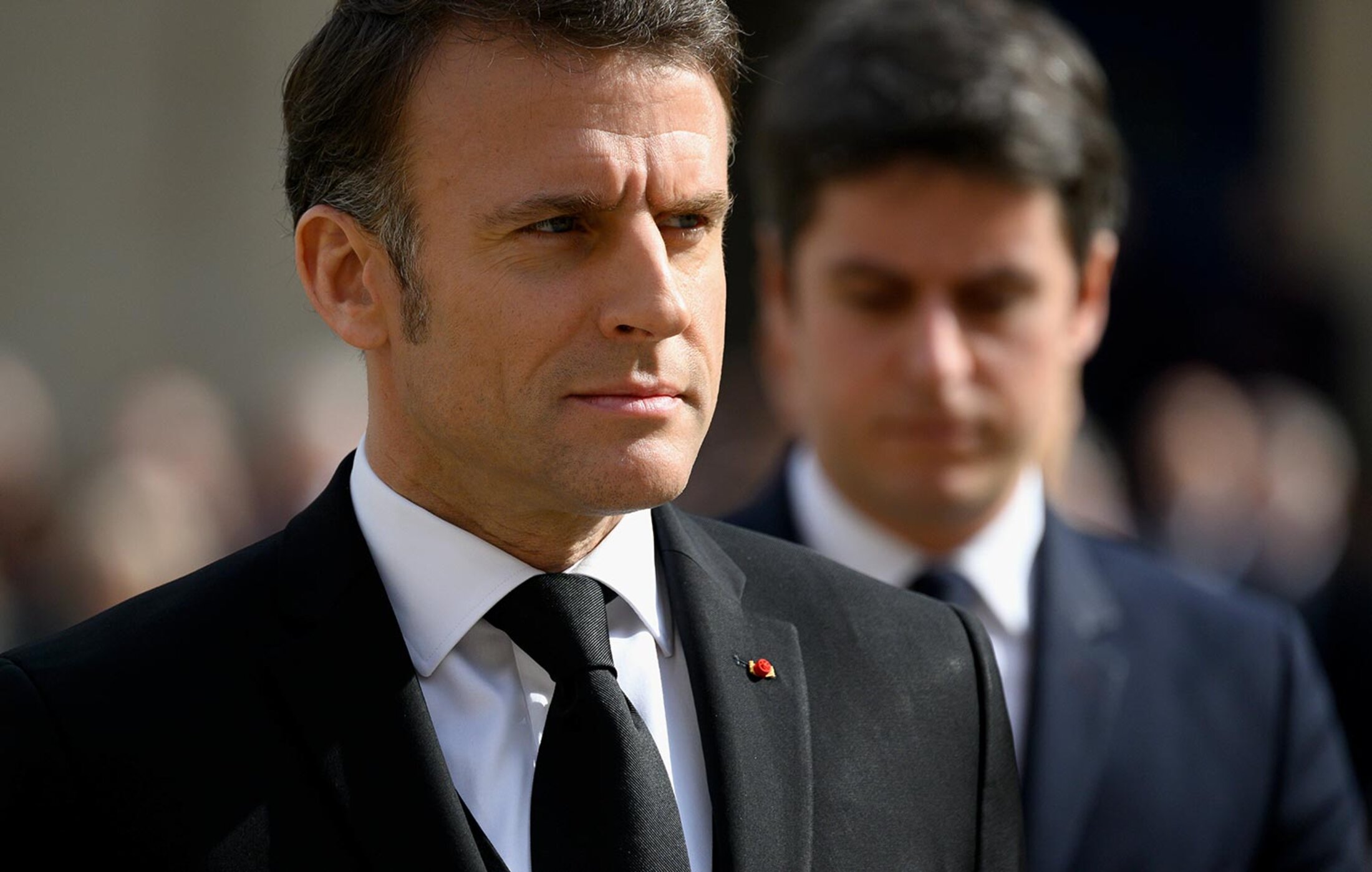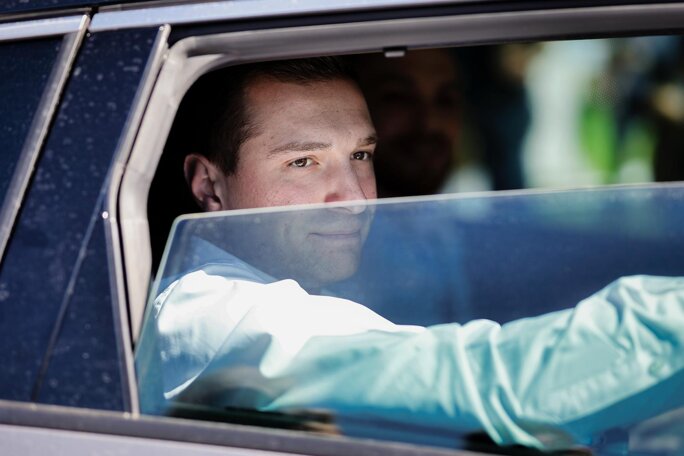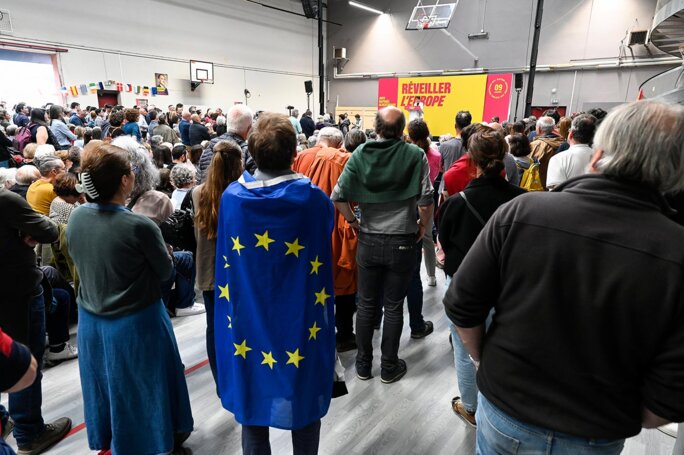We're suffocating! The televised debate between prime minister Gabriel Attal and the far-right Rassemblement National's Jordan Bardella on May 23rd on France 2 was a rehash of the last two presidential elections in which Emmanuel Macron twice went head to head with far-right leader Marine Le Pen. It was like being being trapped in a political version of 'Groundhog Day', that tragicomic film in which Bill Murray's character, on assignment in Pennsylvania to cover the inane “Groundhog Day”, is forced to relive the same day over and over again.
As the presidential election is the only contest he has ever won, Emmanuel Macron is rather pathetically replaying the same “duel” by crying wolf – over the very wolf he let into the “republican” fold in the first place. Instead of troubling the Rassemblement National (RN), this worn-out scenario bolsters the campaign of the far-right party leader, who is desperately trying to make the election a national one.
To avoid falling into cynicism or abstention, we have to recognise and reject the democratic trap being set for us in this dangerous narrowing of public debate. To save himself and his party, the president is once again laying out the red carpet for his favourite enemy, positioning them as the main alternative political force in France. He is doing this at the same time as the far-right is gaining ground across Europe and when the stakes in these European elections - a proportional single-round vote that tends to favour voting based on conviction - are crucial for the future of our continent.
In a world shattered by the turmoil of war, from the invasion of Ukraine to the massacre of Palestinians, the need for a political Europe, as it was conceived after World War 2 as a driver of peace to overcome and prevent disasters, has in fact never been more pressing. Between June 6th and 9th, 360 million citizens from twenty-seven states will get the chance to cast their vote.
The stakes are high: this is about about renewing the European Parliament, which is regarded as the democratic heartbeat of the Brussels institution, alongside the Commission - the executive which is supposed to defend Europe's general interests - and the Council, which represents the views of the member states.

Enlargement : Illustration 1

The new electoral balance of power will not only determine the choice of the president of the European Commission but, more importantly, the ability to influence common policies over the next five years in the face of adversity. Our collective ability to overcome and endure the current turmoil depends on it.
The stakes are doubly significant because the importance of Europe's response to the brutality of ongoing geopolitical upheavals is matched only by the disruptive potential of the continent's far-right parties. We are heading through something of a paradox: nationalist movements, which foster withdrawal and rejection, are growing at a time when the need for alliances and a commitment to social and human rights is the greatest it has been for 80 years.
Far-right's domain expanding
The picture is a grim one: the far-right is in control in Hungary and Italy, having previously held power in Poland. It is part of coalition governments in Finland, Slovakia and, more recently, Holland. It backs the majority party in Sweden and is on the brink of power in Croatia, while also making significant inroads in Bulgaria, Cyprus and Portugal.
In the previous European elections in 2019, these parties achieved unprecedented results, increasing their number of seats in the European Parliament from 37 to 115 (out of 705). This time, being more powerful and numerous than five years ago, they are expecting to further strengthen their grip. The two groups in Parliament to which far-right parties belong, the European Conservatives and Reformists (ECR) and Identity and Democracy (ID), to which France's Rassemblement National is affiliated, together hope to secure between 150 and 200 seats at this election (out of 720).
Though divided on various issues such as support for Ukraine and their stance towards Vladimir Putin, these nationalists, demagogues, and other assorted illiberals are united over their rejection of Muslims, foreigners, and migrants, their challenge to the rights of women and LGBTQIA+ people, their defence of the “traditional” family and Christian values, and their criticism of the costs of green transition. In the past they shared the idea of leaving the European Union; now, their aim is to remould it in their image.
If they do as well as they hope in these elections, they could significantly influence the legislation adopted in Strasbourg and the way the European Union is governed over the next legislative term. While they are unlikely to oust the “grand coalition” - made up of the European People’s Party (EPP), the Progressive Alliance of Socialists and Democrats (S&D), and the liberals of Renew, who between them command 419 seats - they could shake it up enough to encourage the conservative right of the EPP to form opportunistic alliances.
The risk of a “fusion of the Right” is not merely hypothetical, given that such alignments are already taking place, particularly when it comes to immigration. The Commission president, Ursula von der Leyen of the EPP, has made it known she is not opposed to cooperating with the ECR group, which includes the Polish Law and Justice party (PiS) and Italy’s Fratelli d’Italia (FdI) or Brothers of Italy party led by Giorgia Meloni, with whom von der Leyen maintains cordial relations. The only potential obstacle to their ascent to power is the sheer diversity of the profiles of these far-right parties' members - and the internal rivalries that typify them.

Enlargement : Illustration 2

All too aware of the imminent danger, the writer and winner of the Nobel Prize for Literature Elfriede Jelinek, who was born in Austria in 1946, has been quick to speak out publicly against the resignation or even “passivity” of European citizens. During a demonstration against the far-right AfD party in Germany on January 28th, a text of hers was read out in which she expressed concern about how easily far-right ideas are spreading.
“I hear a monster breathing,” she warned. “I hear the breath of democracy weakening. I'm glad that so many of you are here and want to breathe new life into it. I hope it's not too late.” She added: “The republican arc [editor's note, which, broadly speaking, includes mainstream politics and politicians, and excludes the extremes], which everyone loves so much, is being stretched further and further, with people chipping away at it with hammers and mallets so that more and more people can fit under it, and the old as well as the new Nazis are once more becoming respectable. The others may leave, or they'll be forced to leave.”
Those responsible
How did “never again” become “they're already here”? For it is not enough to criticise the rise of nationalism, as Emmanuel Macron does, to prevent the worst from happening. Quite the contrary. Before turning to the French president, it is worth recalling that, having grown stronger over time, the European Union (EU) shares some responsibility for the current deadlock.
The neo-liberal approach that has underpinned its actions for decades - illustrated by its commitment to free trade agreements, free competition rules, and austerity budget criteria - has restricted redistribution policies and exacerbated a deterioration in public services. By inadequately tackling social injustice, it has fuelled rather than quelled anger.
But Europe, which the philosopher Peter Sloterdijk considers is still searching for its post-imperial destiny, is in many respects merely a reflection of the dynamics within each country. The far right did not need the EU to thrive so hideously in France. Emmanuel Macron, and before him presidents François Hollande and Nicolas Sarkozy, have failed to contain it, if indeed they have not actively helped it grow.
Faced with Rassemblement National’s attempt to turn this election into an “anti-Macron referendum”, the head of state has himself stepped into the fray in a bid to (re)launch the campaign of Valérie Hayer, the lead candidate for his ruling party Renaissance. “Our Europe can die,” he warned dramatically in his speech at Sorbonne University in Paris on April 25th, but without hinting at any shift on economic and social issues. What “paradigm shift,” as he calls it, can he claim, when France has distinguished itself in Brussels through its machinations to strip some European directives of their substance? These include in particular an EU directive on “due diligence”, which was meant to compel multinationals to address their negative impacts on the environment or human rights, and one on the gig economy, intended to improve workers’ rights.
Given the national policies brought in over the past seven years, what credibility does he have to confront “illiberal” regimes? His plea for “humanism” cannot be taken seriously, as his concessions to the far-right have continued to mount. To cite only recent examples, his defence of the law on (in reality, against) immigration – which was ultimately stripped by the country's Constitutional Council of its most xenophobic measures on national preference, i.e. giving preferential treatment to French citizens - has shown the pitiful face of a government turned in on itself, ready to betray our country's fundamental principles. At odds with their claims of defending human rights, Macronist MEPs did not bat an eyelid when to came to voting for a “migration pact” that has been criticised by non-governmental organisations (NGOs), with the French president even arguing that it did not go far enough in terms of “firmness”.
When Emmanuel Macron defends a “more democratic Europe,” one cannot help but be disturbed by the scant regard for public liberties in France itself, with a demonisation of student protests against the war in Gaza and witch hunts against those accused of being “apologists” for terrorism.
Convergences
To stem the tide of the far-right and find a response to international upheavals, European citizens need a completely different political direction. In the same way that economist Catherine Samary, a member of the global justice network ATTAC and the anti-capitalist NPA party, has written on Mediapart about the need to “challenge the institutions through voting and through struggles”, so progressive leftwing forces are striving to promote a social, ecological, feminist, anti-racist, anti-authoritarian, anti-imperialist, and anti-colonialist Europe.

Enlargement : Illustration 3

How can we respond to the needs of the electorate when the far-right vote is fuelled not only by social breakdown but also by the reactivation of deeply-rooted racist reflexes in our liberal European societies, the legacy of a long history of domination and colonisation? Leftwing candidates are right to seek to improve the living conditions of workers by addressing the cost of living, criticising free trade agreements, and promoting ecology with an awareness of its social impact. They are equally right to defend the genuine equality of rights against those who espouse an unequal racial order, with the experience of the Macron approach demonstrating that any concessions to the RN only serve to strengthen it.
The Left's error, at least in France, lies in becoming embroiled in petty squabbles, which drown out their policy proposals. Given the seriousness of the danger, they have a huge responsibility, and their infighting is unforgivable. This is especially true since, despite their differences, or even disagreements, on issues such as Ukraine's accession to the EU, the Israeli-Palestinian question, and nuclear energy, the parties of the former NUPES – the broad-left alliance that fought the last Parliamentary elections - espouse demands that are much closer to each other than they appear.
In a report for the Berlin-based Rosa Luxemburg Foundation, Laura Chazel, a specialist in the European radical Left and an associate researcher at Sciences Po Grenoble in France, has observed “ever-greater convergences” across all dimensions - international, European, economic, environmental, social, and cultural - since the end of François Hollande's presidency in 2017.
There is thus a broad consensus on reversing the neo-liberal trajectory of European integration, reinstating the wealth tax (ISF), transforming the Common Agricultural Policy (CAP), relocating pharmaceutical production to Europe, investing in green and social transition, fighting tax evasion, and providing a dignified welcome for exiles.
These policy convergences are reflected in the European Parliament where, as the researcher notes, nearly 80% of votes during the last legislature were identical, these findings based on the analysis of 14,910 votes across twenty-one categories. On international issues, particularly defence and diplomacy, the average is somewhat lower due to differences between France's radical left La France Insoumise (LFI) and the Socialist Party (PS) over NATO. However, contrary to popular belief, she insists that the different sections of the Left are not irreconcilable, even on the war in Ukraine, where there is “strong cohesiveness” in voting.
In response to the public war of words that masks the reality of this closeness on issues, there have been calls for unity from ATTAC activists and the Copernic Foundation, from figures from civil society who have proposed holding “anti-fascist assemblies,” and from the CGT trade union's general secretary, Sophie Binet, who reminds us that “the far-right always comes to power when the Left is divided”.
But for now, these calls have yet to cut through the noise sufficiently to create a “common front,” a “constellation” or whatever form such a movement might take.
Mobilisation
In addition to the urgent requirement to demonstrate complementary approaches, there is a pressing need to build transnational social and civic campaigns in order to open up common perspectives. As abstention becomes an escape route for those who no longer see their vote as having an impact or are weary of vainly trying to “stand in the way” of the far-right, it is worth recalling that a democracy worthy of the name is something that requires daily acts and attention. It involves discussions, demonstrations, meetings, the exercise of public liberties, and the free expression of counter-powers. It cannot be simply be reduced to the moment of voting and the rule of the majority. Otherwise, we risk falling into the “soft tyranny” described by the 19th century French political philosopher Alexis de Tocqueville, where citizens “shake off their state of dependence just long enough to select their master and then relapse into it again”.
Increasingly entrenched in his top-down hold on power, Emmanuel Macron has done everything during his presidency to sideline societal bodies such as trade unions and associations. Yet he could not prevent the eruption of the “yellow vest ” protests onto the French political scene a few months before the previous European elections in 2019, nor the massive protests against the pension reform four years later.
Even now, protest movements across Europe are forging lasting convergence among new generations who are demanding women’s rights and action on the climate, opposing large-scale farm irrigation projects and coal-fired power stations, expressing support for the Palestinian and Ukrainian peoples, and urging resistance against the far-right, as exemplified by the march in Germany at which Elfriede Jelinek's words were heard.
These struggles for equality - which are crucibles for boosting political awareness among both the young and old - act as a bulwark against the fascist threat by making real alliances that might otherwise seem abstract until tested. By encouraging solidarity, these struggles can defuse any trend towards single-interest protests and the rejection of minority groups, particularly those that are racialised.
In his book 'Des électeurs ordinaires. Enquête sur la normalisation de l’extrême droit' ('Ordinary Voters: An Inquiry into the Normalisation of the Far-Right' published by Seuil in 2024), sociologist and political scientist Félicien Faury echoes Olivier Schwartz's concept of “triangular social consciousness”. According to this idea, RN voters, caught between a privileged globalised elite on one side and an impoverished class on the other, tend, if nothing is done to dissuade them - or worse, if everything is done to encourage them - to direct their resentment towards the “bottom” of the social ladder, identified as non-whites and/or immigrants, out of fear of themselves slipping down the rungs of that ladder.
Defusing racism through social struggles by realising that the dysfunctions of our society stem less from supposed welfare “scroungers” than from the “dominant” classes defending their interests offers a perspective – not a particularly new one – that is capable of shifting perceptions by creating common cultures. This could perhaps help rally lost voters such as Colombe, a 60-year-old woman who was recently thrust into the media spotlight after appearing on a news bulletin. In any case, it could combat the resignation and fatalism that always benefit those who have less to lose from the triumph of hate.
The impetus can only come from us. Holding the line requires everyone to get involved at their own level: from local marches, like the brave one organised in Béziers in the south of France in the stronghold of far-right mayor Robert Ménard, to transnational discussions, such as the debate in which members of the CGT, CFDT, and Unsa unions exchanged views with fellow Italian and German trade unionists. Nor should we forget what an online newspaper such as Mediapart can achieve, in partnership with its readers, through its revelations and warnings.
-----------------------------------------------------------------------------
- The original French version of this article can be found here.
English version by Michael Streeter


